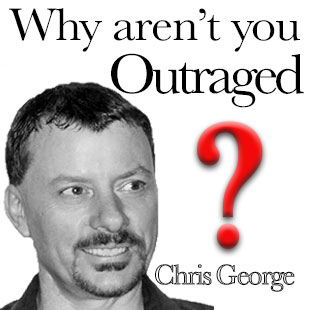
(CHRIS GEORGE / iNFOnews.ca)
August 07, 2018 - 12:05 PM
OPINION
Something that has puzzled me for quite some time is what motivates people to ignore contrary evidence when justifying their beliefs.
When discussing climate change, for example, it seems that no amount of solid evidence will budge anyone out of their mindset. An often cited motivator for this behaviour is "human nature", a catchall phrase for things like greed, sloth, and arrogance. Some see the roots not in people but in society's systems, capitalism topping the list. I think a main driver is human nature but not as it is defined above.
Running for public office and studying psychology taught me a lot about the "why" behind a lot of the behaviours I had experienced during my time in business. Discovering what motivates people and adjusting accordingly has so many applications in all facets of our social, economic, and political interactions that it is no wonder it is so intensively studied.
Environmentalism as a movement in society is no exception. Environmental groups have expended a lot of time and effort into figuring out what makes people tick and how to make environmental messages stick.
Yet the thinking in environmental circles has always been that if only we could get people to look at the evidence and truly understand it that they would then get on board and help work toward solutions to environmental problems.
This is clearly not happening, yet the thinking hasn't changed. The failure that stems from bombarding people with information has led to a doubling down, with the answer being to generate even more information and a more intense bombardment.
I think that no one can quite figure out why intelligent people can assess an argument, understand all of the supporting material, comprehend the implications, and yet not respond to the conclusions.
Psychology has contributed a large number of possible motivations. Economists plead self-interest and its cousins' greed and selfishness as primary drivers of behaviour.
The public? Some of us still hope that politicians will suddenly start responding to our observations of the real world; others prefer to draw lines around what "real" means, casting inconvenient observations from outside that line into the aether.
It was in this context that I ran across the idea that the human capability for denial, something that we all manifest in many different ways in relation to beliefs and observations, wasn't simply a psychological coping mechanism. It could be the primary evolutionary adaptation that set homo sapiens apart from all other intelligent creatures. As such it is baked into who we are. It is literally human nature, not a flimsy justification for poor behaviour.
The short form of the theory is that a theory of mind (ToM) is an excellent adaptation for a social species. Compassion, empathy, fellow feeling; all are rooted in our ability to look at another human and see ourselves. We aren't great at it but it definitely had an impact on our species' rise to dominance on this planet. A member of a cohesive group is more likely to reproduce than a loner or a member of a loosely connected group.
A downside to this adaptation is that along with the mirror into our selves, the ToM allows us to watch others suffer injury, illness, and death. We then extrapolate those observations to conceptualize our own inevitable demise as an individual. Depression and long-term fear are highly maladaptive. If you can't drag your self out of bed because of existential fear, well, food isn't going to gather itself, and prospective mates aren't going to be too impressed. And you aren't going to reproduce.
Enter our capability for denial.
The authors posit that ToM and this capability arose in our species at close to the same time, somewhere around one hundred thousand years ago.
Denial on its own is also highly maladaptive. Refusal to fear the obvious rustling in the bushes by denying it was there didn't really work out well for individuals. And yet denial can lead to optimism bias, our penchant for trying new things with the hope that it will work out. And this worked for the group as these new ways of doing things could be passed on to future generations.
But if we put denial and ToM together, we enable the evolution of a more powerful brain. Temporizing our thoughts by looking back to plan ahead needs more memory and better cognition. We get compassion, curiosity, and innovation on the upside with only periodic bouts of depression and denial.
And here we are, the dominant species on Spaceship Earth.
As an explanation of otherwise irrational behaviour by large numbers of humans, the idea that denial is part of what it is to be human answers a lot of questions.
Denial prevents us from recognizing and altering behaviour that threatens our long-term survival. Short term survival, after all, has always worked to get the next generation out the door. And evolutionarily speaking, that is all that has really mattered.
Until now.
— Chris George believes one measure of a just society is found in how well it balances fiscally conservative economics with social responsibility and environmental soundness in all of its living arrangements.
We welcome your comments and opinions on our stories but play nice. We won't censor or delete comments unless they contain off-topic statements or links, unnecessary vulgarity, false facts, spam or obviously fake profiles. If you have any concerns about what you see in comments, email the editor.
News from © iNFOnews, 2018